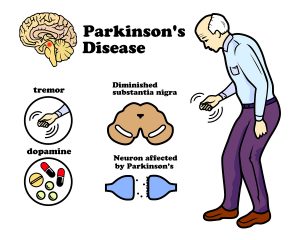Parkinson’s disease is common in the US; new research shows that the use of an old anti-depression medication can stopParkinson’s disease The use of nortriptyline, a 50-year old antidepressant has shown to normalize a nerve cell protein. In rats nortriptyline dissolved toxic alpha-synuclein clusters in brain cells. These toxic protein clusters seem to be happening in the brain of Parkinson’s disease patients also. It is the protein by the name of alpha-synuclein that research first found in rats to cause the toxic protein clusters in nerve cells of the substantia nigra, a part of the brain stem.
But nortriptyline was able to normalize the concentration of the protein. In preliminary studies in humans the investigators found that there was a significant improvement of Parkinson’s disease with the use of nortriptyline.
Placebo controlled trial with nortriptyline
Now a research team from Michigan State University in Grand Rapids conducted a larger clinical placebo-controlled trial. The lead researcher Collier of the study group found that Parkinson’s patients who received treatment for depression with the tricyclic agent nortriptyline needed less dopamine, the main drug used to treat Parkinson’s disease. This indicated to the researchers that nortriptyline was preserving brain cells that were still making their own dopamine. In rat experiments they could show that it was the dissolving of toxic alpha-synuclein proteins by nortriptyline that was the key to therapeutic success.
Lisa Lapidus, a co-worker on the Michigan State University research team summed up their research: “What we’ve essentially shown is that we are dealing with a drug that the FDA approved already 50 years ago. Patients tolerate the medication relatively well. This could be a much simpler approach to treating the disease itself, not just the symptoms.”
Parkinson’s disease may be stopped also by old diabetes drug
Thomas Foltynie found that the diabetes drug exenatide helps patients with Parkinson’s disease. Dr. Foltynie is a professor of neurology at the University College London and co-author of the study.
Exenatide is an injection drug. When preliminary studies showed that this drug was effective in helping Parkinson’s disease patients lose their problems with walking and balance, a formal study followed.
Professor Foltynie designed a study where 60 people with Parkinson’s disease either got injections of exenatide or placebo injections. Patient exams followed regarding their musculoskeletal system and balance at baseline and every 12 weeks. A score system of 132 points assessed their Parkinson’s disease. After 48 weeks those who had been taking exenatide had a gain of 1 point on that scale while the placebo group dropped 3 points. After 48 weeks the drug administration (exenatide) finished. But after another 12 weeks another scoring and assessment of the Parkinson’s disease symptoms took place. The experimental group on exenatide scored 3.5 points higher than the placebo group. This suggests that exenatide is helping to treat the cause of Parkinson’s disease, not just the symptoms.
Parkinson’s disease may also stop through the use of caffeine
Parkinson’s disease was in the news again because of another study that involved breaking up misfolded alpha-synuclein through caffeine.
Misfolded alpha synuclein forms clumps inside dopamine producing cells in the substantia nigra of the brain stem. Misfolded alpha synuclein acts like a toxin to the dopamine producing cells and eventually these cells die off. This is the brain region that is responsible for making muscle movements smooth and stabilizes balance. The cells that have misfolded alpha synuclein clumps in them also go under the name of “Lewy bodies”.
Dr. Jeremy Lee from the University of Saskatchewan (Saskatoon, Saskatchewan, Canada) has isolated two compounds from coffee. They are called C8-6-I and C8-6-N. They can bind to alpha-synuclein and prevent clumping, which stops the toxic effects on dopamine producing nerve cells. Like with nortriptyline the caffeine effect is a curative approach to Parkinson’s disease.
Conclusion
There is a new therapeutic approach to Parkinson’s disease. Researchers have detected a protein called alpha-synuclein to cause toxic protein clusters in nerve cells of the substantia nigra, a part of the brain stem. When these cells die from the accumulation of these misfolded proteins, patients come down with Parkinson’s disease. But three different methods of treatment can improve Parkinson’s disease by dissolving the protein alpha-synuclein.
- Nortriptyline was able to normalize the concentration of the protein. In preliminary studies in humans the investigators found that there was a significant improvement of Parkinson’s disease with the use of nortriptyline.
- Exenatide, an injection drug for diabetes, has been described to help Parkinson’s patients get better.
- Caffeine can also dissolve misfolded alpha synuclein (two compounds from coffee called C8-6-I and C8-6-N). This helps patients with Parkinson’s disease to stabilize.
This is only the beginning of a new approach to Parkinson’s disease and an attempt to cure the disease by dissolving the underlying mechanism. So far the drugs that are in use for Parkinson’s disease are only attempting to stimulate dopamine producing nerve cells to produce more dopamine. But the underlying pathology of accumulating misfolded alpha-synuclein clumps is not yet in the treatment protocol. The new research is different, as it takes this into account in an attempt to prevent the condition.






